Russia’s war against Ukraine has entered a new phase. Drone and missile attacks on Ukraine’s energy infrastructure are now frequent and massive, overwhelming current air defenses.
These often include the same Iranian-made Shahed drones that Tehran just launched at Israel. President Volodymyr Zelensky said their sound, whether in the skies over the Middle East or in Europe, “must serve as a wake-up call for the free world.”
Officials in Ukraine say they can “count on one hand” the number of thermal and hydroelectric power plants across the country that have not yet been severely damaged or completely destroyed.
Last week a large facility near Kiev was hit. In the northeast, in Ukraine’s second largest city, Kharkiv, all three large power plants lie in ruins. DTEK, a private energy company, has revealed that its capacity is at less than 20% following repeated missile attacks.
As Ukraine struggles to repair what it can and maintain power to homes and industries, calls for outside help are becoming increasingly urgent. The Russian attack has not stopped.
The red and white striped chimneys of Kharkiv Thermal Power Plant No. 5 are still visible for miles. Get a little closer and the destruction beneath will be revealed. The main building is pierced by a huge hole. All around is a mess of blackened metal and shattered concrete.
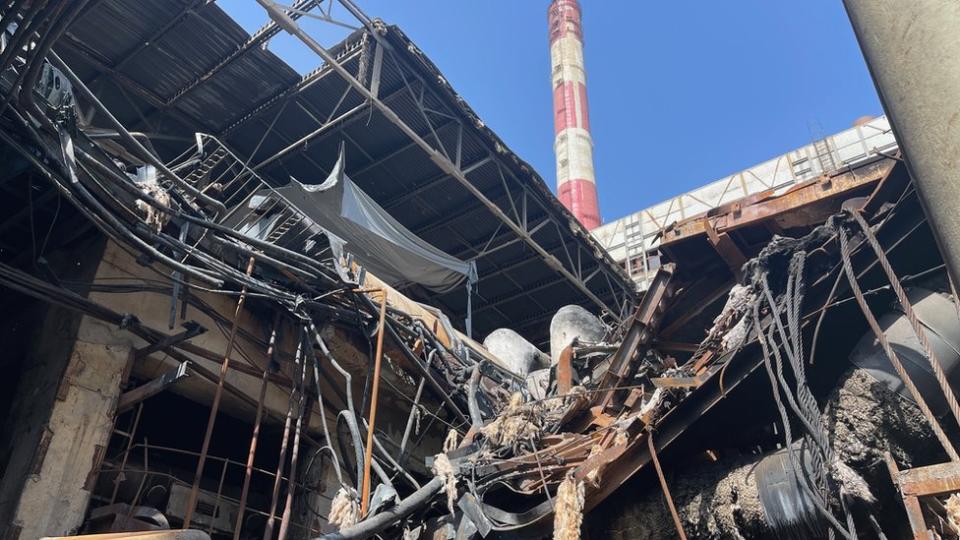
The March 22 attack was deliberate and devastating. Five Russian missiles hit the same spot, destroying turbines, generators and transformers and bringing the power plant to a standstill. A week later, Russia attacked the city’s power plants again.
For Ihor Orlovskiy, this feels personal.
“It’s like looking at the ruins of your own house. It brings pain and tears,” says the deputy director, leading me over chunks of metal and stone to the spot where the rockets exploded.
He has been working here since the Soviet era.
“It’s a very bitter feeling. But it also mobilizes us to rebuild. Because we know that a city with more than a million inhabitants depends on us.”
There have been six attacks on this power plant since the full-scale invasion began, but the March attack was by far the worst.
It was also the most disheartening: it took engineers a full year to repair part of the facility, and two weeks after it was restarted, Russia hit in exactly the same place.
Other industry sources tell similar stories of increasingly precise attacks. In the past, it is said, rockets did not do their job or caused less damage.
This leads some to suspect that Russian agents in Ukraine are passing information to Moscow: the power plants cover a huge area and the damage or repairs cannot be hidden.
But Russia already knows where to reach.
The heavy machines come from the USSR, Soviet labels still hang on the ruins and the old construction plans of the facilities can be found in Moscow.
Ihor Orlovskiy suspects that the increased precision is more due to the sheer intensity of recent attacks. “If you fire five, six, seven rockets in the same place, some are bound to hit.”
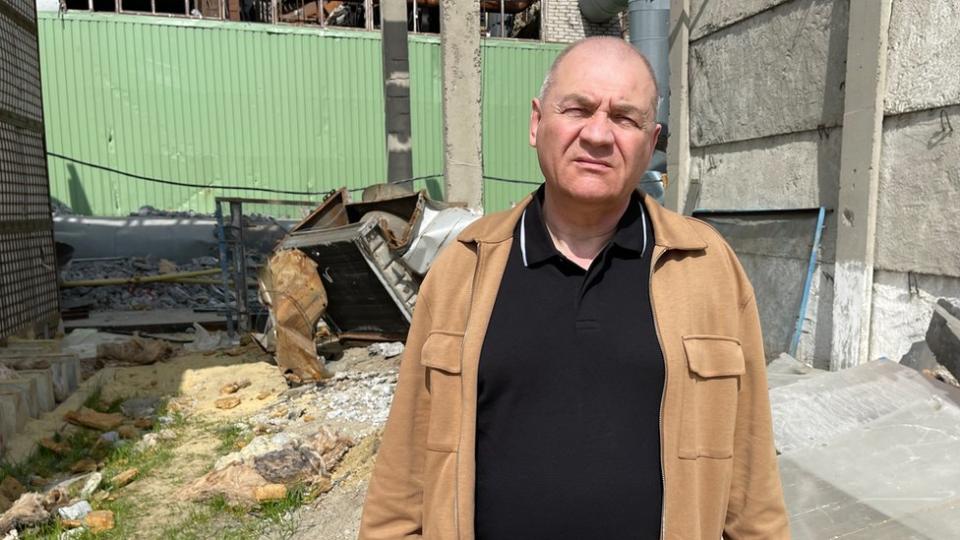

There are huge electricity pylons in the surrounding fields. But since March nothing has flowed in this direction from power plant No. 5 or the other thermal power plants in Kharkiv.
The city must source electricity from western Ukraine, resulting in limited supplies and regular power outages. The Russians have also targeted substations.
Local authorities are working to minimize the impact and shorten the time households and businesses are left in the dark. Residents have learned to charge their devices and multiple power banks as soon as the power is on. They also keep supplies of water for drinking and washing.
The Kharkiv subway is back in operation, albeit intermittently, as are the traffic lights. But with unreliable power supplies that could get worse, companies are developing their own solutions.
Kharkiv is a major publishing center and Oleksandr Popovich, the head of a major printing company, says it has been relying on three generators for weeks.
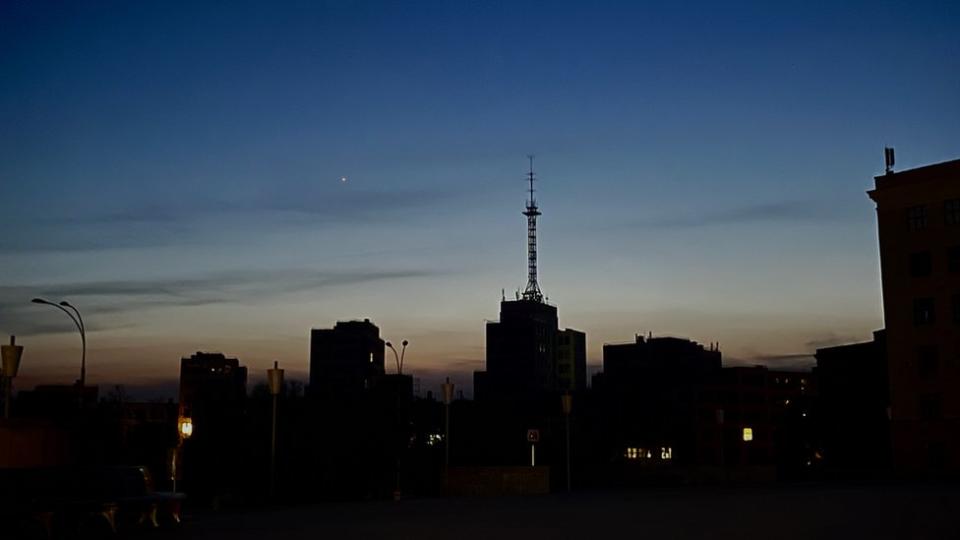

Early in the war, a rocket arrived 100 m (330 feet) from the main production line.
“It destroyed our entire warehouse and 10 tons of paper. But a hard day only makes us tougher,” says Mr. Popovich, exuding the spirit of defiance and determination that has become Kharkiv’s trademark.
“Unfortunately I can’t fix the electricity,” he says.
“But everyone has to do their own job. Mine is to produce books until we win. We have to keep working. We have to give people in Ukraine the chance to read new books.”
Although the company considered moving its location further away from the Russian border, it decided to stay and even invested in increasing production.
Now that Russia is targeting Kharkiv with renewed focus, he admits he is worried: “Then I think about our army. Our soldiers must know that they are not defending empty cities. They defend cities with people.”
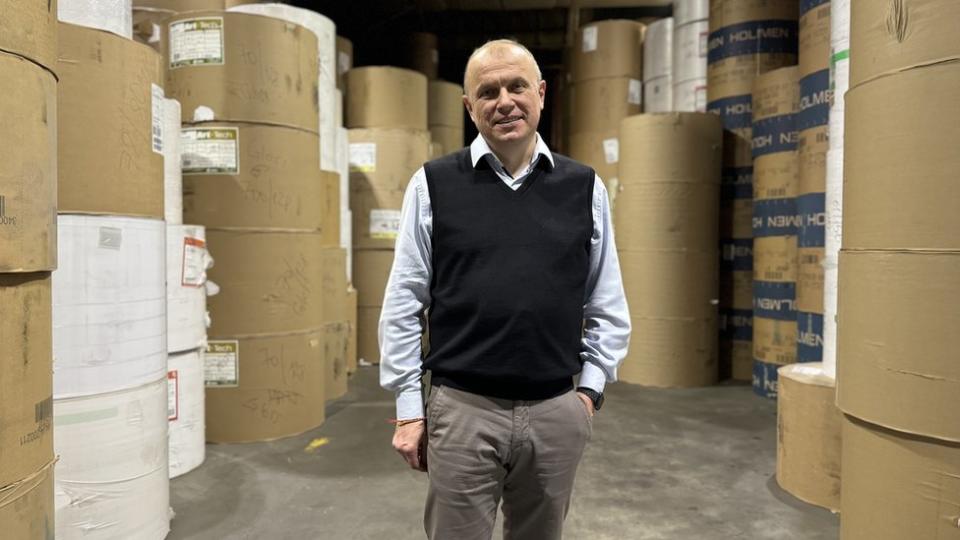

Dozens of his own employees have signed up to fight. A photo of a soldier who died on the Eastern Front hangs next to the main entrance.
The reports from the front are now sobering.
Ukraine’s commander-in-chief, General Oleksander Syrskyi, said over the weekend that the situation on parts of the front line had “significantly deteriorated.”
Warmer weather and firmer ground helped Russia launch attacks with armored vehicles and put renewed pressure on Ukrainian forces, he wrote on Telegram.
The fighting around Chasiv Yar in Donbass is particularly fierce. The general expects Russia to want to take the area by May 9, a symbolic date on which Moscow celebrates the Soviet victory over Nazi Germany.
General Syrskyi described his troops’ “heroic” efforts to “hold back the enemy’s daily attacks.” But he also mentioned the need to improve their “moral and psychological” condition.
After more than two years they are exhausted. But when MPs in Kiev finally voted on a new law regulating the mobilization of men, the amendment that set a limit on the length of time men could fight was deleted.
Against its enemy’s larger army, Ukraine needs all the soldiers it can muster.
The decline in sentiment is compounded by ammunition shortages on the front lines and the US Congress’ continued failure to approve a key aid package for Kiev.
Like everyone else here, the Ukrainian troops feel that their war is slipping back on the international agenda.
And now there is new cause for dismay as many note the disparate response to the escalating crisis in the Middle East.
Israel received direct assistance in protecting its skies from Iranian missiles and drones, even as the same countries limited their assistance to Ukraine, which is under attack by Russia every day.
president Zelensky indicated his frustration when condemning Iran’s actions.
“The world can’t wait for the discussions to continue,” the Ukrainian president wrote on Twitter or
Germany has just pledged to send an additional Patriot air defense unit to Ukraine “immediately.” Volodymyr Zelenskyj thanked Chancellor Olaf Scholz for his support at a “critical moment” and called on other countries to follow his example.
The personnel of Kharkiv Power Plant No. 5 would welcome the protection.
Repeat attacks
“We just fixed things, and now we have to start all over again,” a worker named Yury told me. “We’ll sort it out, but the main thing is that we don’t get hit again!”
As he and others assess the damage, salvage what they can and devise a plan to rebuild, they face numerous air raid sirens every day.
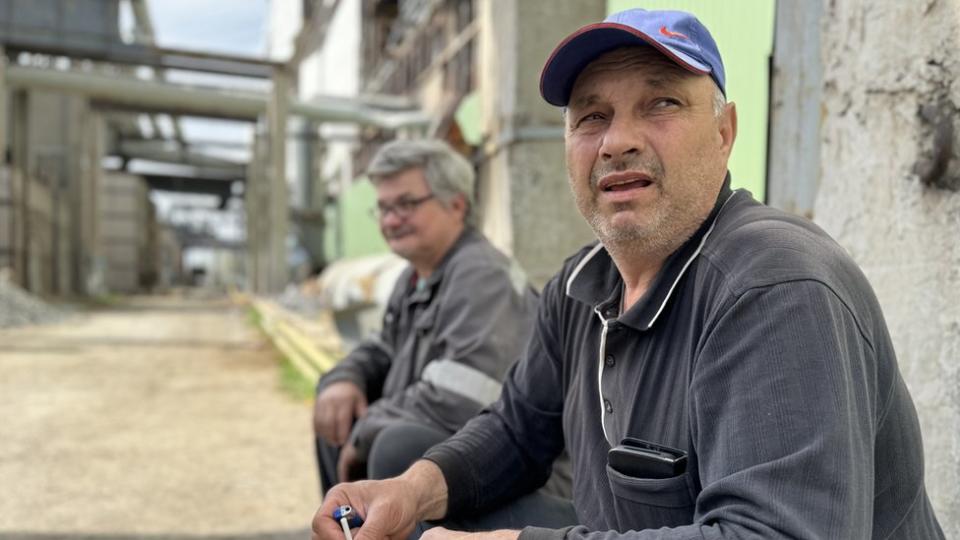

There are two types of alarms, explains a fire marshal. When the threat appears to be focused on the border, some 40 km (25 miles) away, some continue to work.
“But when we see that there is a missile threat to Kharkiv, then there is an announcement: ‘Urgent! Go to the emergency shelter immediately!’” he says.
This slows down the recovery work and strains the nerves. Any missile fired at Kharkiv will hit within seconds, and personnel are surrounded by clear evidence of the danger.
But it’s not just the engineers and construction teams who are back at work.
When we arrived at the facility, a group of women were clearing the paths, painting the curb, and even pulling out dandelions around the main entrance.
A little later I found her down in the bunker during another air raid.
“Life goes on and we still have to make sure it stays beautiful,” said one woman, even though the entire power plant was in ruins.
“We like to ensure cleanliness and order. That’s our job. But it’s also good for the mind!”
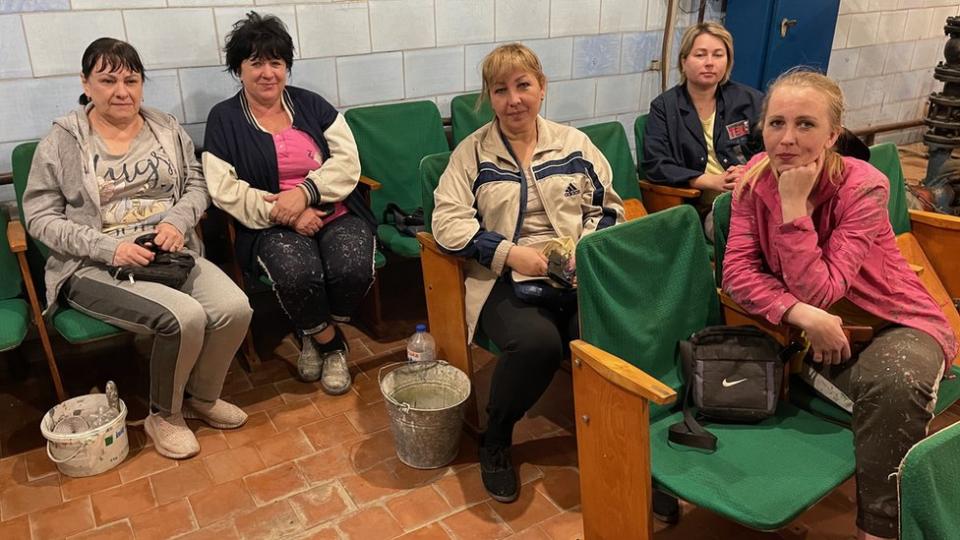

The women had also painted the underground bunker a fresh “salad green,” adding a touch of cheer to a Cold War-era bunker built to withstand a nuclear attack from the West.
Instead, it protects Ukrainians from ballistic missiles fired by their neighbor.
“They say it’s that we surrender, that they want to scare us so that we run away from here,” another woman interjects as the airstrike ends and she prepares to go back to work.
“They want us to leave Kharkiv. But we won’t do that.”
Produced by Hanna Tsyba and Kostas Kallergis
